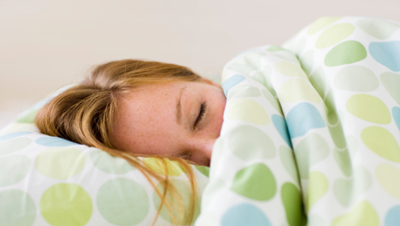
Do you have difficulty sleeping at night? Have you ever considered that the food you eat can play a big part in your nightly slumber?
Sleep is very important to your health and yet you may not be getting enough of it. A National Sleep Foundation survey revealed that 60% of adults suffer from sleep complications a few nights a week or more. Adults require seven to eight hours of sleep daily but there are approximately 40 million U.S. citizens experiencing over 70 sleep disorders, including insomnia. Approximately 33% of Americans are regularly affected by insomnia.
Could your diet be behind your lack-of-sleep? There are several unhealthy and even healthy foods that can prevent you from getting some nightly shut-eye. Dark chocolate contains even more caffeine than coffee (and can encroach on your sleep time). Eating before bed is generally not good practice and will disturb your sleep because you are not giving your body the adequate time it needs to digest the food. Alcohol, spicy food, and large meals–especially meals that contain deep fried or fatty foods–should be avoided at night if you want to sleep well.
5 Foods for Better Sleep
1. Almonds
Almonds are an excellent source of magnesium, which helps promote quality sleep. The mineral works as a relaxant and tranquilizer in your body as it relaxes your skeletal muscles and the digestive tract. There is 98.7 mg of magnesium in a quarter cup of almonds.
Nuts and seeds (i.e. sesame seeds and pumpkin seeds) can also help you sleep because a lot of them are good sources of tryptophan — an amino acid that is used to treat insomnia. A quarter cup of almonds contains 21.9% of your daily recommended intake of tryptophan!
2. Miso Soup
Miso soup is a healthy food staple in Japan; it might help you fall asleep when eaten at night. Miso is made from fermented soybeans (tofu), seaweed, onions, carrots, and water.
Mood and sleep patterns are regulated because tryptophan serves as a precursor for the neurotransmitter serotonin. Fermented soybeans in miso soup contains 43.8% of the daily recommended intake of tryptophan.
The relaxing soup is also good for digestion and your immune system — it should help you sleep well throughout the night.
3. Mushrooms
Turkey and chicken are very common food sources containing the sleep-promoting tryptophan; however, mushrooms are also an excellent source of the amino acid.
Crimini mushrooms, in particular, contain 25% of your daily value intake of tryptophan and are a good source of another sleep-friendly nutrient—magnesium. Crimini mushrooms look similar to white button mushrooms, but are darker in color.
4. Kale
Most dark leafy greens are good sources of tryptophan — and kale is no exception. It is considered a very good source of the amino acid, making it a helpful food for serotonin production with 9.4% of your daily value intake of tryptophan.
With 23.4 mg of magnesium in kale, it also gives you another muscle-relaxant nutrient to help you sleep well.
5. Whole Grains
Whole grains are good sources of tryptophan and magnesium. Oats, rye, brown rice, bulgur, barley, whole wheat, and buckwheat are the best sources of grains that you can eat to help you sleep.
Quinoa is often considered a whole grain — and it can also be included with the list of healthy foods that promote sleep. It contains 22.3% of your daily value intake of magnesium and 18.8% of your tryptophan intake.
So, if you’re wondering why you can’t sleep at night, look at your diet and slowly change your sleep-disturbing habits.
Related:
- Eating Bananas Before Bed: Good or Bad?
- How Green Tea Helps You With Better Sleep?
- Chamomile Tea for Sleep: Why Should You Take It before Bed?
- Is it Wise to Drink Lemon Water before Bed?
Sources:
Mateljan, G., The World’s Healthiest Foods: Essential Guide for the healthiest way of eating (Seattle: George Mateljan Foundation, 2007), 114-115, 118, 154, 534, 619, 657, 672.
Murray, M., N.D., et al, The Encyclopedia of Natural Medicine: Third Edition (New York: First Atria Paperback, 2012), 44-45.
Neglia, A., “8 Foods That Disrupt Sleep,” The Huffington Post web site, Aug. 7, 2013; http://www.huffingtonpost.com/2013/08/07/worst-foods-for-sleep_n_3709421.html#slide=2776080.
“Importance of sleep,” American Psychological Association web site; http://www.apa.org/topics/sleep/why.aspx, last accessed January 8, 2013.
Wasserman, M., “The health benefits of fermented foods,” Chatelaine web site, Aug. 20, 2012; http://www.chatelaine.com/health/diet/the-health-benefits-of-fermented-foods/.
“9 Foods to Help You Sleep,” Eating Well web site; http://www.eatingwell.com/nutrition_health/nutrition_news_information/9_foods_to_help_you_sleep?page=6, last accessed January 8, 2014.
“How Food Affects Your Sleep,” Joy Bauer.com web site; http://www.joybauer.com/insomnia/how-food-affects-sleep.aspx, last accessed January 8, 2014.
Jio, S., “10 Foods That Can Help You Sleep,” Woman’s Day web site; http://www.womansday.com/health-fitness/10-foods-that-can-help-you-sleep-114149, last accessed January 8, 2014.













